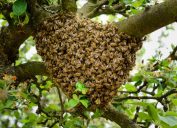Multiple People Attacked by "Cloud of Hundreds of Bees"—How to Protect Yourself
A massive swarm shut down entire roads in a Los Angeles neighborhood.
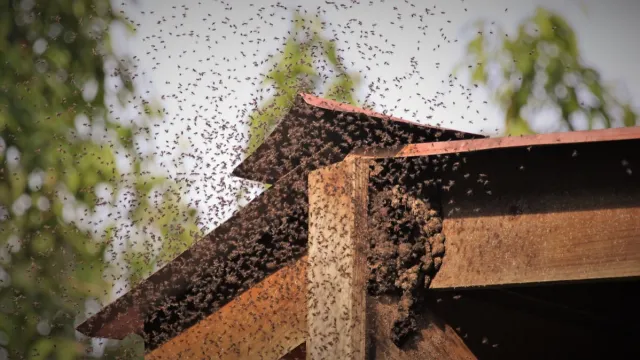
It's not uncommon to be stung by a bee, especially when we start to see more of them in the spring and summer. But while stings can be painful, they're not cause for alarm for most of us, and can be easily treated at home. On May 15, however, a massive bee swarm in Los Angeles led to two people getting hospitalized. Read on to learn more about the "cloud of hundreds of bees," and how you can protect yourself from an attack.
READ THIS NEXT: "Very Large" New Spider Species Discovered—Here's Where There May Be Hiding.
Two people were hospitalized after they were caught in a massive bee swarm.
The Los Angeles Fire Department (LAFD) responded to reports of a bee swarm on the afternoon of May 15. The swarm was so big, per KTLA, that roads in the area had to be shut down, which is when the Los Angeles Police Department (LAPD) arrived to assist.
According to CBS News Los Angeles, the massive swarm landed two people in the hospital on Monday. An adult man sustained "multiple bee stings," while an LAPD volunteer suffered "dozens of bee stings" as he was trying to flee the swarm.
Footage of the attack on the LAPD volunteer was actually caught on tape by Fox 11 News and shared on the department's Twitter. The man is seen swatting the bees away before falling down on the street. According to the department, the volunteer was "assisting with a call for service" when he was attacked, and was in stable condition at the hospital as of Monday night. The second adult man's condition is currently unknown.
In addition to the two reported hospitalizations, Jerry Spotts, a local resident, told CBS Los Angeles that he also saw a UPS driver being attacked.
"He started saying, 'run, bees!' And I got hit right on the lip," Spotts told the outlet.
Professionals were called in to deal with the swarm.
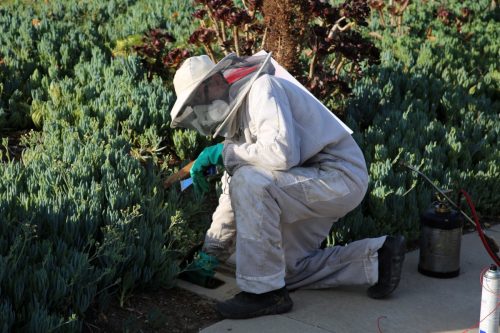
According to CBS Los Angeles, the swarm may have originated from a hive on a home in the neighborhood, but KTLA reported that it isn't yet clear what set the bees off.
The situation was so severe, however, that a professional bee removal service was called in, the LAFD said. According to KTLA, animal control workers sprayed a pesticide that discourages bees from coming back to the area.
"There is like a cloud of hundreds of bees over there," Izak Kharrazi, of local bee removal company All Valley Honey & Bee, told CBS Los Angeles about the situation. "I said, 'oh boy' … That's why right away I put my gear on, because I can see them. They're mad as could be."
According to the Los Angeles Times, other witnesses say there may have actually been thousands of bees swarming at one point.
RELATED: For more up-to-date information, sign up for our daily newsletter.
The bees were particularly "aggressive," according to animal control
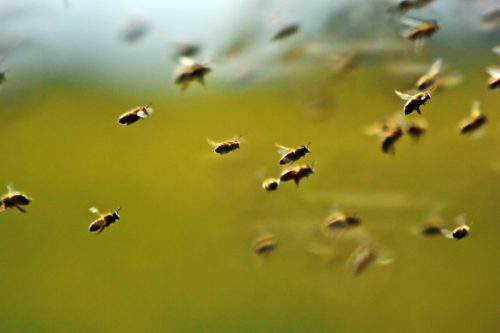
As Kharrazi told CBS Los Angeles, this situation isn't something that happens every day.
"This is not a normal behavior for these bees to be this angry, to want to kill you," Kharrazi told the outlet. "This is not OK."
Brooks Putman with All Valley Honey & Bee told KTLA that the bees were "so aggressive" and came from "such an active hive."
Putnam added, "There are so many of the bees that they look like they have a fairly well established hive."
There are a few ways you can protect yourself from a bee swarm.
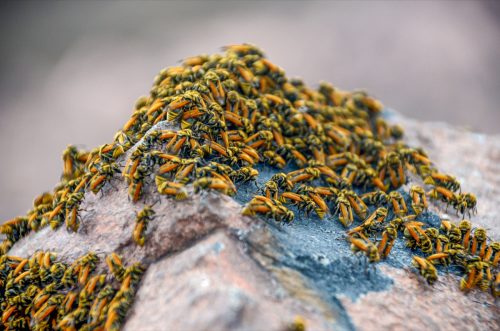
While the swarm persisted, the LAFD instructed all residents "to remain indoors and close all windows/doors." But if you find yourself in this situation without shelter in sight, there are a few other ways you can protect yourself.
If you accidentally disturb a hive or find yourself under attack from multiple stinging insects—like bees, wasps, or hornets—the Centers for Disease Control and Prevention (CDC) recommends that you run to get away from them, rather than swat at them. Swatting might cause bees to sting, and when they do, they release a chemical that can attract more bees to the area.
From there, the agency recommends taking refuge in a shaded area as opposed to an open area. While it may feel like a viable option, the CDC advises against jumping into water to get away from swarming bees.
"Some insects (particularly Africanized Honey Bees) are known to hover above the water, continuing to sting once you surface for air," the agency says.
